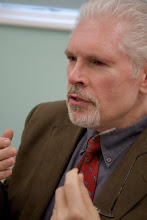For three hours, the theatre was a church, sacred, solemn, and a steeple for contemplation. We've heard that war divides, that soldiers fear battle, know in our hearts that humans fear death. But here on the Warhorse stage these simple truths were laid bare, blurring the line between the theatre as art and as an honest discourse on humanity and politics. We saw Germans, French, and British - unable to communicate verbally - bound by fears about dying on the battlefield and never returning home to loved ones. We saw a French mother and an English one, in different spans of time, worrying about their children and trying to shelter them. We saw brothers, always fighting, unite over worry for their sons at war. It seemed to remind us of truths more important than the color of one's uniform or one's nationality, and motivated questions on the necessity of war.
No less important was the idea that love knows no boundaries. At the beginning, we meet Albert, a young country boy from Devon, and his beloved horse, Joey. From the beginning, we are almost intruders on their quiet intimacy as we watch the two mature together. Joey grows from a foal to a full-sized riding horse, shown beautifully in the play's transitions, and Albert becomes a temperamental teenager, loyal only to Joey. When World War I breaks out, Albert and Joey are separated. Albert, only sixteen, is forced to remain home, and Joey is sold to the British cavalry and shipped to France. Separated by distance but not emotion, Albert soon chases after Joey, joining the British infantry in the process.
The play's artistry motivates our reflection on war. Crows accurately circle dead bodies, horses and men - their shadows haunting on the walls - fall with unflinchingly regularity. As the horses tire, we watch their bodies whittle to skeletons, eventually being shot out of misery. Near the end of the play, when Topthorn the horse dies, the three men controlling his limbs slowly edge away. It as if his spirit is leaving, and offers both an artistic and symbolic understanding of war's tragedy.
In another ending scene, Joey is caught on barbed wire in No-Man's Land, and two soldiers - one German and one English - spot him simultaneously. Their synchronized appeals to their commanders, their eventual approaches to the horse, and how they both entangle Joey from the wire are not-so-subtle reminders of their shared humanity. To watch the determination of Joey's ownership (by the simple coin flip) was almost sacred. Here was a testament to human commonality, to mutual desire to shield the horse from harm, to the pointlessness of fighting.
When Joey is finally reunited with Albert - through a harrowing ordeal when we wonder if Joey will be shot - we have subdued joy. For although their story ends relatively happily, we must also reflect on the scores of lives lost in the battles that came before. And thus Warhorse concludes, abruptly and suddenly, like a war screeching to a halt.
The audience stood, some still wiping tears from their eyes, and shuffled out of this makeshift temple. I stood for a moment, still awed by the beauty, the honesty just shown in front of me. Before I left, I closed my eyes, and I - like the characters at war's end - gave thanks to be alive.
-
Melanie Gin

Powerful, personal, observant, beautiful expression and turn of phrase. A great response to War Horse and its universal message. Dr Q
ReplyDelete